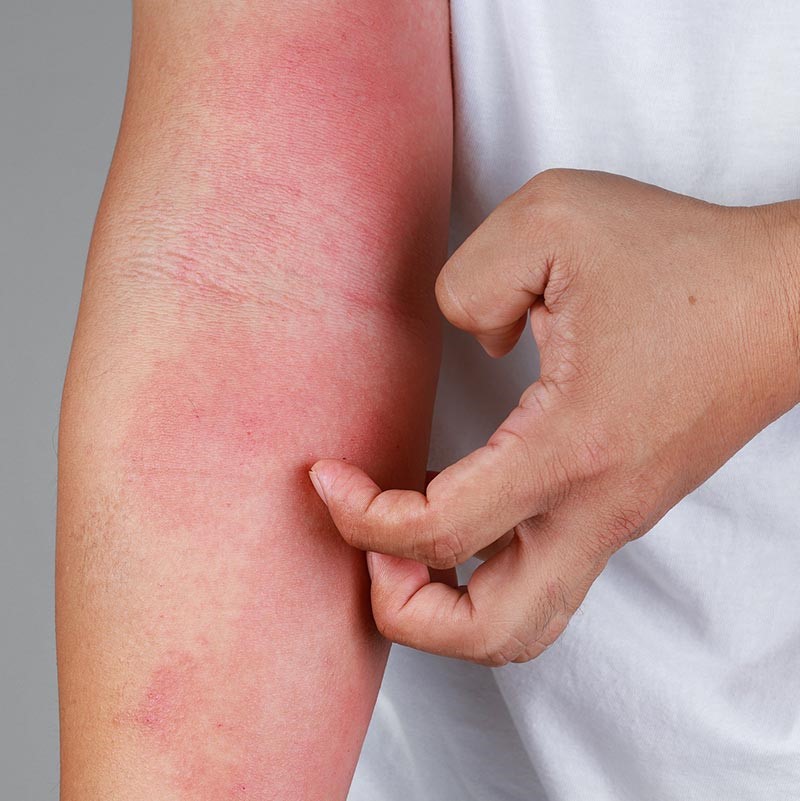Do you have questions about your skin? We’ve got the answers to acne, preventative tips, and everything in between!
Your skin is your body’s largest organ, acting as a protective barrier and is vital to your overall health. It’s natural to have questions about how to care for it. Understanding your skin is crucial, from acne to anti-aging and mole removal to skin cancer prevention. In this post, we’ll dive into the most common dermatology questions and provide expert answers to help you care for your skin confidently.
Ready to take charge of your skin health? Schedule your consultation today and start your journey toward healthier, more confident skin!

What Causes Acne and How Can I Treat It?
Acne is one of the most common skin conditions, affecting people of all ages. It’s caused by clogged pores, often due to excess oil, dead skin cells, and bacteria.
Treatment Options:
- Over-the-counter (OTC): Products containing benzoyl peroxide or salicylic acid can help mild acne.
- Prescription Treatments: For severe cases, dermatologists may recommend topical retinoids, antibiotics, or even isotretinoin.
- Professional Procedures: Chemical peels, laser therapy, and extraction can also reduce acne and prevent scarring.
Prevention Tips:
- Keep your skin clean, but avoid over-washing, as it can strip natural oils.
- Use non-comedogenic (won’t clog pores) skincare products.
- Maintain a balanced diet, as some foods can trigger breakouts.
How Can I Reduce Fine Lines and Wrinkles?
Aging is natural, but many people want to maintain youthful-looking skin.
Preventive Measures:
- Sun Protection: UV exposure is the leading cause of premature aging. Use a broad-spectrum sunscreen daily.
- Moisturize Regularly: Hydrated skin appears plumper and more resilient.
- Lifestyle Choices: Avoid smoking and excessive alcohol consumption as they accelerate aging.
Treatment Options:
- In-Office Procedures: Botox, dermal fillers, and laser treatments can smooth wrinkles and restore volume.
- Topical Treatments: Retinoids and peptides stimulate collagen production.

What Should I Know About Moles?
Moles are common and usually harmless, but changes in their appearance can indicate skin cancer.
When to See a Dermatologist:
- Follow the ABCDE Rule:
- Asymmetry: One half doesn’t match the other.
- Border: Edges are irregular or blurred.
- Color: Multiple colors or an uneven distribution.
- Diameter: Larger than 6mm (about the size of a pencil eraser).
- Evolving: Changes in size, shape, or color over time.
Treatment:
- Dermatologists can perform a biopsy if a mole looks suspicious.
- Benign moles can be removed for cosmetic reasons using simple surgical techniques.
What Are the Best Ways to Prevent Skin Cancer?
Skin cancer is the most common type of cancer but also one of the most preventable.
Prevention Tips:
- Avoid direct sun exposure during peak hours (10 AM to 4 PM).
- Wear protective clothing, hats, and sunglasses.
- Use a sunscreen with SPF 30 or higher and reapply every two hours.
Screening:
- Perform regular self-examinations.
- Visit a dermatologist annually for a professional skin check, especially if you have a family history of skin cancer.
How Do I Treat Dark Spots and Hyperpigmentation?
Dark spots, or hyperpigmentation, can result from sun damage, inflammation, or hormonal changes.
Treatment Options:
- Topical Lighteners: Products containing hydroquinone, vitamin C, or niacinamide.
- Chemical Peels: Help to exfoliate and promote new skin growth.
- Laser Therapy: Targets pigment-producing cells to lighten dark spots.
- Microneedling: Stimulates collagen and helps improve skin texture.
Prevention:
- Always wear sunscreen to prevent dark spots from worsening.
- Avoid picking at your skin, which can lead to post-inflammatory hyperpigmentation.

What Can I Do About Eczema?
Eczema causes red, itchy, and inflamed skin. It can be triggered by allergens, irritants, or even stress.
Management Tips:
- Moisturize Frequently: Choose thick, fragrance-free creams.
- Avoid Triggers: Identify and avoid allergens or irritants.
- Medications: Topical corticosteroids or prescription creams can control flare-ups.
Lifestyle Changes:
- Use mild, fragrance-free soaps and detergents.
- Take lukewarm showers.
Is Hair Loss a Dermatology Concern?
Yes, hair loss can occur due to genetics, hormonal changes, stress, or medical conditions like alopecia.
Treatment Options:
- Medications: Minoxidil and finasteride are common.
- Procedures: PRP (Platelet-Rich Plasma) therapy promotes hair growth.
- Hair Transplants: For permanent restoration in some cases.
When to See a Doctor:
- If hair loss is sudden, patchy, or accompanied by other symptoms like itching or scaling.
How Can I Improve the Appearance of Scars?
Scars form part of the skin’s healing process but can sometimes become a cosmetic concern.
Types of Scars:
- Hypertrophic Scars and Keloids: Raised and thick.
- Atrophic Scars: Depressed, often from acne or chickenpox.
Treatment Options:
- Topical Treatments: Silicone gels or sheets.
- Injections: Corticosteroids for keloids.
- Laser Resurfacing: Improves skin texture.
- Microneedling: Helps with atrophic scars.
What’s the Difference Between a Dermatologist and a Cosmetic Dermatologist?
- General Dermatologists focus on diagnosing and treating skin, hair, and nail conditions, such as eczema, psoriasis, and skin cancer.
- Cosmetic Dermatologists enhance appearance by offering treatments like Botox, fillers, and laser therapy.
Contact us Today
Your skin deserves the best care, and dermatologists are here to help you achieve healthy, glowing skin. Whether dealing with a specific condition or looking to enhance your appearance, understanding your options and knowing when to seek professional help is key. Don’t hesitate to consult a dermatologist for personalized advice tailored to your skin’s unique needs.
Ready to take charge of your skin health? Schedule your consultation today and start your journey toward healthier, more confident skin!
GET IN TOUCH

